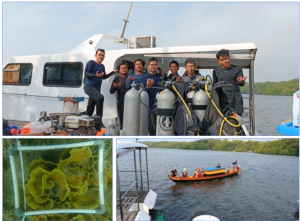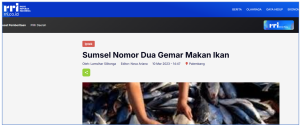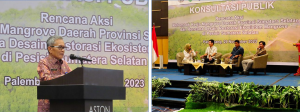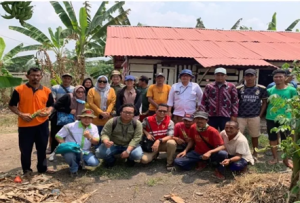
SDG 14 – Indicator 14.3.1 – Conservation and sustainable utilisation of the oceans (events)
Monitoring of the Coral Reef Ecosystem in Enggano Sea
The coral reef ecosystem is a very important ecosystem for marine environments. Coral reefs provide a habitat for fish and other marine life, so it is crucial to maintain the health of the coral reefs. The Enggano Sea is one of the aquatic areas located off the coast of Sumatra Island. To assess the quality of the coral reefs in the Enggano Sea, the Universitas Sriwijaya (UNSRI) team conducted an observation of the coral reefs in 2023. The monitoring report indicated that the coral reef ecosystem in the Enggano Sea is in good condition and well-preserved. The seagrass beds in the area are also in good condition.

Links:
- https://daerahpost.com/advertorial/enggano-mesti-kita-jaga/
- https://forestsnews.cifor.org/82692/penelitian-lintas-bagian-karbon-biru-di-mangrove-kisah-dari-dua-pulau?fnl=en
- https://daerahpost.com/pendidikan/himaikel-unsri-lakukan-penelitian-kerumbuh-karang-di-pulau-enggano/
SDG 14 – Indicator 14.3.2 – Food from aquatic ecosystems (policies)
UNSRI Plays a Role in Increasing Fish Consumption
Universitas Sriwijaya (UNSRI) is one of the universities located in South Sumatra. UNSRI has a Department of Fisheries which is located in the Faculty of Agriculture. Several activities have been carried out by the Department of Fisheries in an effort to preserve fish. This supports South Sumatra in increasing fish consumption because fish is the second food after rice, especially in the South Sumatra region. To support the source of fish raw materials, UNSRI has made Embung which is one of the aquatic ecosystems a place for fish farming on campus. The cultivated fish will then be consumed on campus or sold to the wider community. With the increase in fish consumption, it is expected to fulfill the need for protein in the body.

Link:
SDG 14 – Indicator 14.3.3 – Maintain ecosystems and their biodiversity (direct work)
Mangrove Restoration in South Sumatra
South Sumatra is one of the provinces that has extensive mangroves, which is about 28% of the total mangrove area on the island of Sumatra. With such a large area, mangrove conservation efforts in coastal South Sumatra are important, plus there is still 26,720 hectares of restoration potential. This is because mangrove forests are increasingly threatened by land conversion, especially for land clearing for settlements and ponds. To support efforts to preserve mangroves, Sriwijaya University (UNSRI) has been involved in activities related to mangrove ecosystems, such as mangrove restoration design plans and mangrove working group action plans in collaboration with the South Sumatra Provincial Forestry Service.

Links:
- https://www.ykan.or.id/id/publikasi/artikel/siaran-pers/pemulihan-ekosistem-mangrove-di-provinsi-sumatera-selatan/
- https://www.lenterapendidikan.com/berita/pemerintahan/view/dinas-kehutanan-sumsel-gelar-konsultasi-publik-rencana-aksi-kelompok-kerja-mangrove.html
SDG 14 – Indicator 14.3.4 – Technologies towards aquatic ecosystem damage prevention (direct work)
UNSRI and KLHK Play a Role in Peatland Care Activities
Peatlands are wetlands formed by the accumulation of decaying organic matter. This land is generally found in areas that are always inundated with water, such as swamps, rivers, and coastal areas. South Sumatra Province is one of the provinces with extensive peatlands. The condition of the peat ecosystem in South Sumatra is starting to degrade. This is caused by inappropriate activities, such as making drainage in peatlands to prepare agricultural land, which causes peatlands to dry out and increases the potential for fires. To overcome this problem, Universitas Sriwijaya (UNSRI) and the Ministry of Environment and Forestry (KLHK) conducted a community service activity by forming an Independent Peatland Care Village in an effort to overcome damage to the peat ecosystem through community empowerment. This activity was carried out in areas that have quite extensive peatlands, namely Banyuasin and Pali Regencies. This community-based peatland ecosystem restoration activity is expected to encourage community involvement in efforts to protect and manage peatland ecosystems through the Independent Peatland Care Village.

Link:
